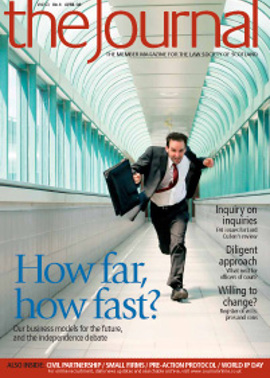Curiosity corner

A jury question?
Breach of the peace has never been the same since Young v Heatly was decided, but that was nearly 50 years ago (1959 JC 66, to be precise). It is interesting therefore to see that in his dissenting opinion in Macdonald v HMA [2008] HCJAC 05; 2008 GWD 04-65, Lord Marnoch suggests that it might be time for it to be reconsidered.
The case in question is an unusual one. The appellant was charged with two counts of breach of the peace arising out of statements made in an interview with two female psychologists. At a hearing on a preliminary issue the judge had held that the issues raised should go for determination by a jury, and this decision was appealed. The appellant had previously been convicted of assault with intent to rape and sentenced to six years’ imprisonment. The charges under appeal arose out of things he was supposed to have said in the course of interviews and, as he pointed out, in private and in response to questions designed to elicit answers.
The cause was remitted by the appeal court with instructions that as framed the indictment could not stand. It was stated that the material point was the context in which the answers were given, and not whether or not the ladies were alarmed by them. It was further stated that the context of the interview did not lend itself to the definitions of breach of the peace to be found in longstanding cases. One can see the reasoning behind the majority decision, but it is difficult not to feel that Lord Marnoch’s position, which was that ultimately the context was a matter for the jury to decide, does have certain practical advantages.
Rejecting mitigation
Another somewhat unusual situation occurred in the case of HMA v Murray or Kerrigan [2008] HCJ 1; 2008 GWD 07-126. Usually prosecution and defence manage to agree a narrative on which a plea of guilty proceeds. In this case the accused pleaded guilty to being concerned in the supply of controlled drugs, but contended that he merely supplied a “safe house” to others in return for drugs for his own use. The Crown did not accept this. The judge offered proof in mitigation, which both sides rejected. Thereafter it was advanced on behalf of the accused that as the Crown was not in a position to lead evidence contrary to his stated position, he should be sentenced on that basis. The Crown submitted that it was quite entitled to say that it did not accept the basis in fact on which the plea was tendered.
The trial judge declined to sentence on a basis which the Crown did not accept, and the defence having refused the opportunity of leading evidence in mitigation, it was stated that sentence was to be decided on the basis that the accused’s involvement was not limited to providing a safe house. The lesson for defence agents would appear to be clear, namely that unless the Crown agrees, or perhaps agrees not to disagree, the leading of evidence in mitigation is necessary.
Anderson appeals
The case of Burzala v HMA [2007] HCJAC 67; 2008 GWD 01-10 is reported on the topic of the actus reus of rape, but we are here concerned only with the subsidiary argument in the appeal, namely the claim that the appellant did not receive a fair trial because material aspects of his defence were not presented properly. Once this ground of appeal became available some years ago now, appellants, often with little justification, began to try to avail themselves of it. This may well have led to defence lawyers thinking that they had better do or say things which otherwise, in an exercise of a proper discretion, they would not have bothered with. (No doubt in the same way, if ever it becomes possible to lodge a statutory complaint about the way one was treated by a judge, there will be a similar influx – but we digress.)
In Burzala, the reasons for certain decisions taken in the presentation of the defence had to be looked at, but once that had been done the court does not seem to have had much difficulty in that the various decisions taken by counsel were not such as no competent counsel would have taken in the circumstances.
Devolution issue?
Ever since it was originated until recently, the Court of Criminal Appeal had the last word and it was something of a matter of pride that we did not allow the House of Lords to do to our criminal law what it was suspected of having done to our civil. The situation is now changed, of course, with appeals to the Privy Council competent, in certain circumstances, under the Scotland Act 1998. Murphy v HMA [2007] HCJAC 72; 2008 GWD 01-13 deals with an application for leave to appeal following an unsuccessful appeal against conviction (2007 SLT 1079). The ground was that the appellant claimed that he had been denied a fair trial in terms of article 6 of the Convention by virtue of delay, the time having elapsed between the conduct libelled and the trial being 34 and 42 years. In particular it was argued that the right to a fair trial included the right to a properly prepared defence, and because of the lapse of time, many potential defence witnesses had died and also an electrical generating device referred to in certain allegations had been discarded and was thus unavailable. Further, the appeal court, in holding that the trial judge had not been obliged to give specific directions about the effect of the passage of time and the loss of potential sources of evidence, had taken an approach contrary to that laid down in Holland v HMA 2005 SC (PC) 3.
The court held that the application for leave was incompetent, as would be the contemplated appeal, since the determination of the court refusing the appeal had not involved the determination of a devolution issue. The court also gave as its opinion that if it were thought that, for some reason, there had been a determination of a devolution issue, it would not have been appropriate for appeal to be taken to the Privy Council where the appeal was essentially about the availability or otherwise of evidence and the directions given by the trial judge about that.
Judging article 6 fairness
The Scotland Act was also under consideration in the case of Dyer v Von 2008 GWD 06-105. This was a Crown appeal against a decision of a sheriff sustaining devolution minutes alleging unreasonable conduct on the part of the Crown by virtue of non-disclosure of the names of police officers involved in the incident in question. The minutes had been sustained at an intermediate diet.
On behalf of the Crown it was argued that the correct way for the respondents to have proceeded was by specification of documents, which would have made the minutes unnecessary. It was argued in response that the Crown’s attitude in response to a legitimate demand for disclosure breached s 57(2) of the Scotland Act, in that the Lord Advocate had acted in a way incompatible with article 6 of the Convention. The appeal was allowed and the case remitted to the sheriff. The appeal court held first that the requirement for a fair trial could not normally be determined until the trial had actually happened, except in blatant cases, of which this was not one; and, secondly, that there had been no prejudice since the possibility of a specification of documents remained open. The court observed that if there had been a trial against the background of the Crown’s present attitude and a conviction, there would have been an almost unanswerable position on appeal in relation to the breach of article 6.
Extension following Crown error
Finally, Paterson v HMA [2008] HCJAC 3; 2008 GWD 03-47 is an unusual case about circumstances in which there may be justification for an extension to the so-called 12 month rule, that is to say an extension granted to the Crown under s 65(3) and (5) of the 1995 Act. The appellant’s trial had been deserted pro loco et tempore when it became apparent that a passage containing the appellant’s alleged confession to B, a witness, had been redacted in the statement disclosed to the appellant’s legal advisers. Thereafter it was argued that the error being inexcusable, the Crown had not passed the first part of the test laid down in Swift v HMA 1985 SLT 26 and it was therefore not necessary to consider the second, discretionary, part. It was also argued, inter alia, that the trial judge had misdirected himself in considering the whole circumstances rather than following the approach set out in Swift and Early v HMA 2006 SLT 856.
The court held that the error could be regarded as excusable, the circumstances being that the witness B wanted to be taken into protective custody and that this was a reason for full disclosure not being made at the earlier stage. The court accepted that this redaction was intended to be temporary and that there was no intention deliberately to conceal passages of evidence of crucial importance. The court did however accept that the trial judge’s approach had been flawed, in that he had treated the whole matter as one for his discretion rather than following the approach outlined above. This meant that the matter was open for the court to approach de novo, and having regard to the gravity of the charge, which was murder, and the public interest that the appellant should stand trial, the application was granted.
In this issue
- Thinking ahead
- A line too often crossed
- Big leap forward
- Independence: still viable?
- FAIs: a new lease of life
- ARTL: Turquoise is in the pink
- Summary trials: deciding the facts
- Life at the sharp end
- Conscience and public service
- Wills and ways
- Achieving "senior" rates?
- CPD: the way forward
- Life on the edge
- Pre-action protocol for industrial disease claims
- Fit a doin'?
- Same difference
- Curiosity corner
- System? What system?
- Reviewing appeals
- Testing insolvency
- Scottish Solicitors' Discipline Tribunal
- Website reviews
- Book reviews
- Day of creation
- Lawyer behind the camera
- Homing in on home reports






